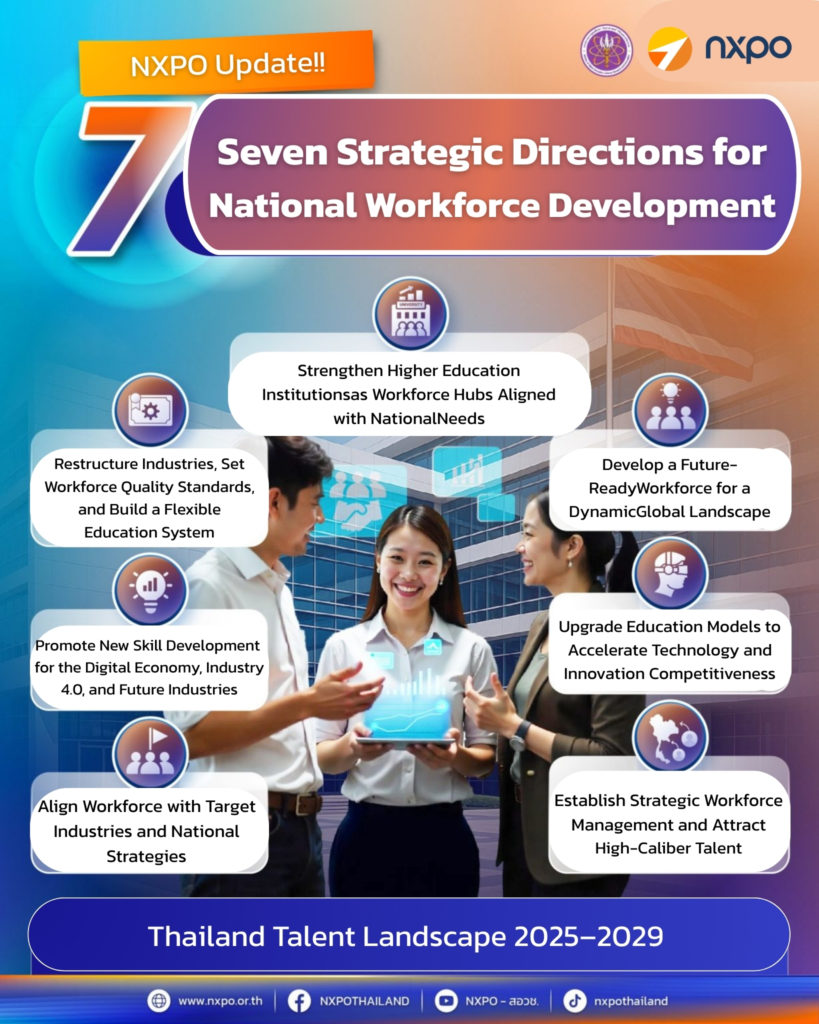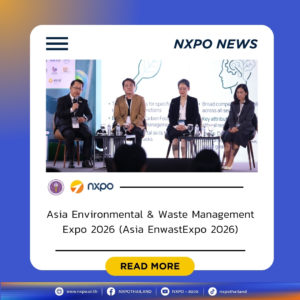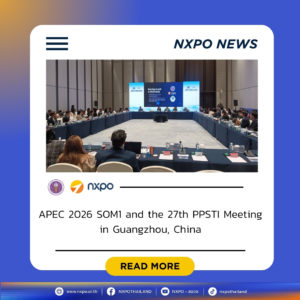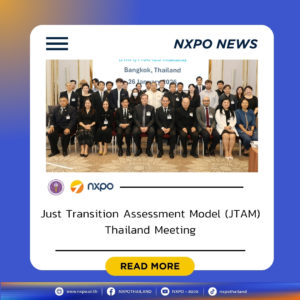Thailand faces workforce challenges on multiple fronts, driven by both external and internal forces—including rapid technological change, commitments under the United Nations Framework Convention on Climate Change (UNFCCC), and generational shifts in the labor force.

To address these challenges, NXPO launched Thailand Talent Landscape 2025–2029, a study assessing the demand for high-skilled talent in target industries. The study proposes seven strategic directions to guide national workforce development:
1. Strengthen Higher Education Institutions as Workforce Hubs Aligned with National Needs
- Co-develop curricula with industry and local communities to equip graduates with practical skills and adaptability to industrial change.
- Position universities as incubators for technology, innovation, and startups, supporting research and innovation that drive Thailand’s new economy.
- Build strong academia–industry networks to co-create training programs and establish new skills standards for target industries.
- Expand co-operative education and work-integrated learning (Co-op & WIL) to provide students with hands-on experience for job readiness.
2. Restructure Industries, Set Workforce Quality Standards, and Build a Flexible Education System
- Update occupational competency standards to cover essential skills in high-growth sectors such as AI, IoT, biotechnology, and clean energy.
- Establish internationally recognized professional qualifications (e.g., ISO, PMP, AWS Certification) to boost global competitiveness.
- Apply learning quality indicators to ensure curricula align with labor market demands.
- Implement skills assessment and certification systems based on work experience, enabling credit accumulation and certification.
- Leverage big data and AI to track emerging skills trends and adapt curricula.
3. Develop a Future-Ready Workforce for a Dynamic Global Landscape
- Design flexible curricula enabling workers to choose specialized skills tailored to industry demands.
- Emphasize STEM alongside soft skills such as critical thinking, teamwork, and communication.
- Create industry-specific programs for sectors like EVs, AI, biotechnology, and the circular economy.
- Promote lifelong learning and a growth mindset to support adaptability.
- Expand on-the-job training and apprenticeship programs for workplace-relevant skills.
4. Promote New Skill Development for the Digital Economy, Industry 4.0, and Future Industries
- Accelerate reskilling, upskilling, and cross-skilling to enable smooth transitions into digital and multi-disciplinary roles.
- Offer short, intensive, hands-on training delivered by the private sector and educational institutions to close skill gaps and develop a job-ready workforce.
- Use project-based learning and apprenticeships to foster practical expertise.
- Support hybrid learning models that combine in-person and online platforms to enhance training accessibility and efficiency.
- Build digital economy infrastructure, including training centers in AI, cybersecurity, and digital marketing.
5. Upgrade Education Models to Accelerate Technology and Innovation Competitiveness
- Use AI and big data to design training aligned with labor market needs.
- Integrate virtual reality (VR) and simulation technologies into training for sectors like healthcare, engineering, and automotive.
- Promote open educational resources (OER) to expand affordable access to learning nationwide.
- Enhance hybrid learning systems blending online and in-person formats.
- Establish Learning Innovation Hubs to connect universities and industry in skills development.
6. Align Workforce with Target Industries and National Strategies
- Train talent for high-potential industries including EVs, the Bio-Circular-Green Economy (BCG), digital technology, AI, and advanced manufacturing.
- Provide pathways for engineers, researchers, and technology developers to build research and specialized skills for an innovation-driven economy.
- Integrate workforce development into smart city initiatives to meet technological and societal needs.
- Establish centers of excellence (COEs) to build industry-specific expertise.
- Support adaptable skills to ensure clear career paths and long-term professional growth.
- Align workforce policies with sustainable development goals across economic, social, and environmental dimensions.
7. Establish Strategic Workforce Management and Attract High-Caliber Talent
- Implement Brain Circulation and Utilization programs to connect global and domestic experts with Thai industries.
- Create funding mechanisms for research, technology, innovation, and advanced skills training.
- Offer incentives for Thai professionals abroad to return and contribute to national development.
- Build public–private partnership (PPP) mechanisms to coordinate workforce strategies with national goals.
- Develop talent attraction systems offering competitive benefits and career opportunities for both domestic and international talent.
- Strengthen academia–industry collaboration in high-demand and specialized fields.







